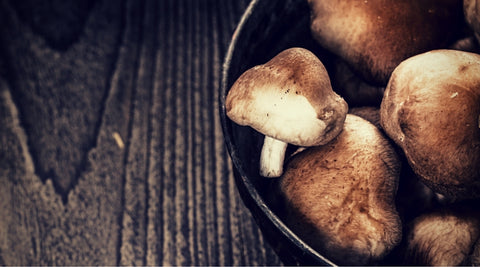 Author: Lily Mazzarella
Author: Lily Mazzarellaneither plant nor animal nor mineral…….Get to know a mushroom!
SHIITAKE {nice to meet you} Lentinula edodes
“Shii” = name of several types of tree upon which shiitakes grow, in Japanese “take”= mushroom, in Japanese Aka: black mushroom, black forest mushroom, donko
Yes, that’s two i’s
Native only to Asia, and prized as food and medicine there for several thousand years, the shiitake is now one of the most popularly consumed mushrooms worldwide. If you’re in the US and think you see these growing in a forest near you, think again. Unless the log has been inoculated, you’re not looking at a shiitake!
Instead, you will most likely find them at the farmer’s market (sold by someone who is cultivating them), or your local co-op or natural grocery store.
A good shiitake has a flat-to-rounded, meaty cap that curls slightly under at the edges, with clean, firm white gills on the underside. Take care when selecting them, as they can hold moisture and harbor molds if old or improperly stored. The cap should have no slimy spots, and the stem should be dense, but not dried out. They should smell like, well, not a whole lot. Any “off” odor indicates decomposition.
Shiitakes have a richer umami flavor than white button mushrooms, and can permeate a broth or brown rice, subtly but beautifully. They also absorb flavors well, and are enhanced by tamari, miso, or just a bit of salt. I often use fresh stems and dried caps for my Immune Broths, and reserve the fresh caps for slivering into stir fries and soups. We’ll end with a recipe for a fabulous Immune Star Stir Fry—but first, let’s take a look at some of shiitake’s myriad health benefits.
Shiitake has it going on
This unassuming mushroom is a pharmacological powerhouse, exerting many of its beneficial effects in the immune system. The compounds thought to be responsible for shiitake’s immune modulating properties are its polysaccharides (large, branching carbohydrate molecules), of which shiitake has a unique variety. It contains many different polysaccharide glucans, some of which are extraordinarily well researched, such as beta-1,3 glucan and lentinan. Shiitake mushrooms also contain important non-glucan polysaccharides, including fucoidans and galactomannins, as well as non-polysaccharide medicinal compounds. Overall, lab studies and human studies suggest that compounds in shiitake:
- increase important cancer-fighting chemicals
- increase apoptosis (programmed cell death) in cancer cells
- increase macrophage and NK cell activation
- protect macrophages from oxidative damage
- beneficially modulate T cells
- have direct anti-tumor effects
- have direct anti-microbial effects
Have you heard of Lentinan?
A quick perusal of Pubmed.gov (the database for the National Library of Medicine) turns up 40 clinical trials on lentinan, a polysaccharide extract from shiitake that is usually administered intravenously (that’s a lot of trials for a natural compound!). Many of these studies document promise in the realms of gastric and colon cancers, hepatocellular carcinoma, breast cancer, and HIV. These studies, carried out in humans, show increased survival times, improved outcomes, improved quality of life, and enhanced immune activity associated with lentinan administration. Interestingly, in these studies, the extract is usually given alongside conventional medication and chemotherapy—a tactic long-employed in Japan, China, and Korea during cancer treatment. Lentinan has been approved in Japan as an adjuvant treatment for stomach cancer since 1985!
AHCC
“Activated Hexose Correlated Compound” is a fancy name for a proprietary alpha-glucan-rich extract of shiitake mycelium grown in rice. While most research on AHCC has been funded by the manufacturer, this supplement still shows enormous promise—and unlike lentinan, is easily obtained. Studies in humans have shown oral intake of AHCC in humans to increase NK cell populations and activity. Another recent human study on oral AHCC intake demonstrated an increase interferon production (our own anti-virus/anti-cancer chemical) without any adverse effects. I’ve seen great results with this extract in my practice for people with relapsing viral illness, low NK cell populations and activity, and recovery from cancer treatment.
Cardiovascular benefits
We may not think of eating medicinal mushrooms for cardiovascular support, but it turns out they are great medicine for the modern American condition: inflamed blood vessel linings, high “bad” cholesterol, and activation of immune cells involved in laying down plaque in arteries. Shiitakes exert benefit in each of these areas.
Lab studies have shown that compounds from shiitake block adhesion molecules such as ICAM-1 and VCAM-1, which promote atherosclerosis (some animal studies even suggest a degree of reversal of this serious condition). By blocking adhesion molecules, shiitake may help keep the endothelium—the lining of our blood vessels, and the site of much cardiovascular disease—healthy.
Shiitakes also contain key antioxidant minerals: manganese, selenium, and zinc, as well as ergothioneine, which may help fuel and protect our cells’ mitochondria.
Multiple studies feeding shiitake to rats with high cholesterol show lipid-lowering effects. Ingestion of the whole mushroom seems to cause higher excretion of cholesterol in the feces, and appears to regulate gene expression involved with overproduction of triglycerides and other lipids. Beta-glucans, which are found in oatmeal as well as mushrooms, are known to have cholesterol-lowering effects in humans—but other novel compounds unique to shiitake may be responsible for this effect as well.
Breaking news! Eating shiitakes makes us healthier!
What has been known in Chinese medicine for 6000 years is being confirmed by modern scientific inquiry. Two recent studies on consumption of whole shiitake mushrooms in the diet showed great promise:
In one very cool study on cancer patients, one specialized diet was given to people in treatment, and another diet given to those in remission. Both diets heavily relied upon plant foods and were low-glycemic and included antioxidant-rich foods such as blueberry, garlic, kale, and turmeric. The only medicinal mushroom utilized was shiitake. These personalized diets improved anticoagulant and antioxidant status, as well as immune cell-mediated cytotoxicity (cancer-fighting activity by the body’s own immune cells) in the treatment groups. While shiitake alone is certainly not the only reason for improvement in these parameters, I suspect they played an important role—and I just love the idea of “personalized dietary interventions” being studied. This is what we do at Farmacopia every day!
The next whole shiitake study was more straightforward: it looked at the effect of consumption of whole, dried shiitakes (like you might find at Whole Foods or your co-op) on immune function in 52 healthy men and women, aged 21-41. The researchers looked at many different markers of immune activation and inflammation, and concluded that the whole shiitakes improved immune cell activation and proliferation, while reducing oxidative stress and inflammation. Consuming the shiitakes also increased production of secretory IgA, an immunoglobulin found in our guts and our secretions that helps keep threats at bay, and potentially reduces reactivity to foods (see the Fall Cleanse write-up on Mucous Membranes for more info). More confirmation that medicinal mushrooms make our immune systems smarter, and more flexible.
Let’s get down to eating it. Try our Immune Star Shiitake Stir Fry.

